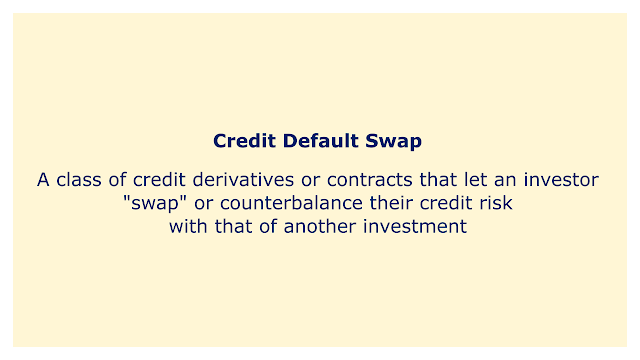 |
| Image: Moneybestpal.com |
Credit Default Swaps (CDSs) are a class of credit derivatives or contracts that let an investor "swap" or counterbalance their credit risk with that of another investment. For instance, if a lender is concerned that a borrower would stop making payments on a loan, the lender may use a CDS to transfer that risk to a different party, who promises to pay the lender in the event of a default in exchange for a recurring charge.
A CDS is written on a third party's debt known as the reference entity's relevant debt or the reference obligation. A multi-name CDS is one that is written on a basket or index of reference obligations, as opposed to a single-name CDS, which is written on a specific reference obligation. The reference obligation may take the form of a bond, loan, mortgage, or another type of debt obligation.
The protection seller and the protection buyer are the parties to a CDS. The protection seller undertakes to pay the protection buyer the face value or the notional amount of the reference obligation less the recovery value in the event of a credit event. A credit event is a predetermined catalyst that signals a default or decline in the reference entity's credit quality, such as bankruptcy, nonpayment, restructuring, or acceleration.
A CDS's principal function is to protect investors from credit risk, which is the possibility of suffering a financial loss in the event that a borrower or debt issuer defaults or doesn't perform as promised. By employing a CDS, the protection buyer can lessen or completely eliminate their exposure to the reference entity's credit risk, while the protection seller can continue to make a consistent profit from the CDS spread or premium, providing that the credit event doesn't happen or is unlikely to happen.
A CDS may also be used to speculate on the reference entity's credit risk, which is the anticipation of market participants regarding the likelihood and seriousness of the credit event. By deploying a CDS, the protection seller can profit from a decrease in the reference entity's credit risk while the protection buyer can benefit from an increase in the reference entity's credit risk as the CDS spread or premium will rise.
A CDS is an over-the-counter (OTC) bilateral contract, which implies that it is negotiated and carried out only between the two parties, without the assistance of a third party or an exchange. As a result, the parties are given additional freedom to customize the contract's terms and conditions, including its maturity, periodicity, currency, and settlement method. However, it also exposes the parties to counterparty risk or the risk of suffering a loss as a result of the other party's default or failure to perform.
A CDS is a sophisticated and dangerous financial product that has been extensively used and traded on the international financial markets, particularly by banks, hedge funds, insurance firms, and other institutional investors. Diversification, liquidity, and price discovery are among the advantages that a CDS might offer, but it can also present risks including systemic risk, contagion, and moral hazard. Due to the way a CDS compounded losses and uncertainty brought on by the subprime mortgage crisis and Lehman Brothers' demise, it played a crucial part in the global financial crisis of 2007–2008.
